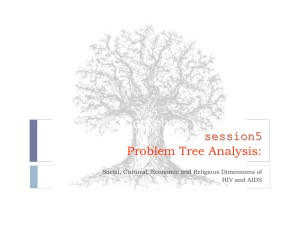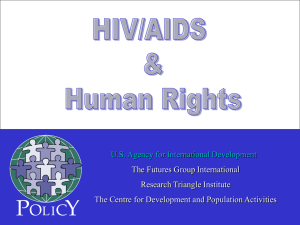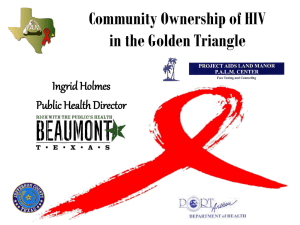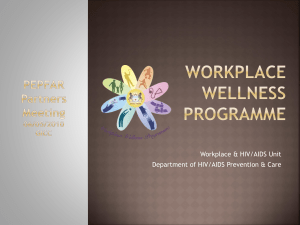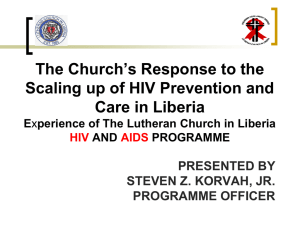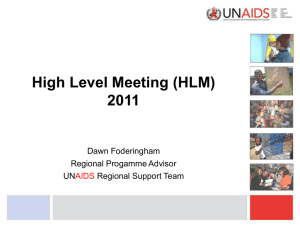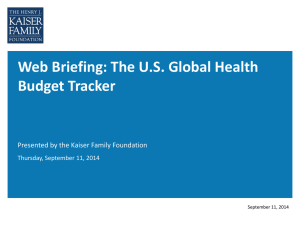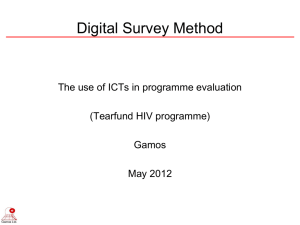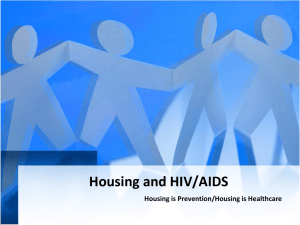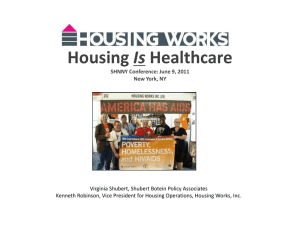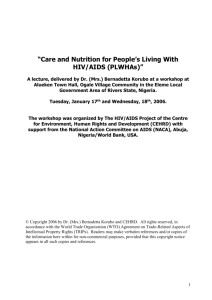PowerPoint Presentation - Housing as an HIV Prevention and Health
advertisement
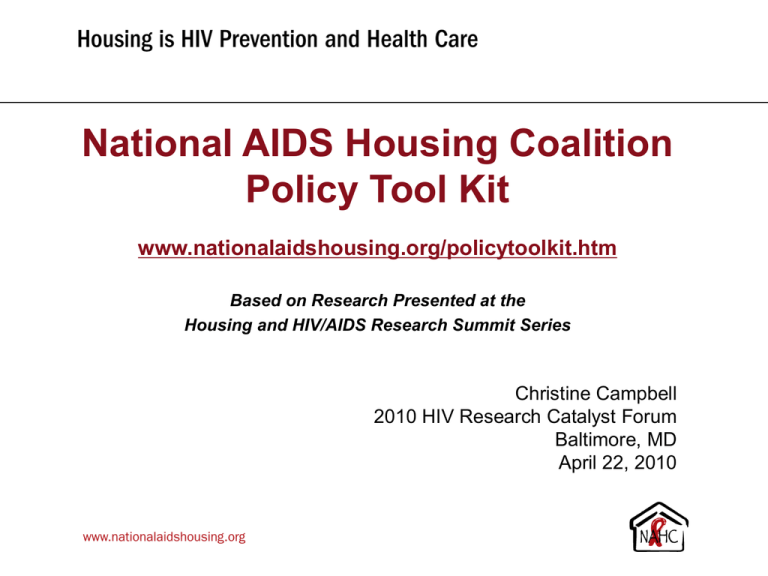
National AIDS Housing Coalition Policy Tool Kit www.nationalaidshousing.org/policytoolkit.htm Based on Research Presented at the Housing and HIV/AIDS Research Summit Series Christine Campbell 2010 HIV Research Catalyst Forum Baltimore, MD April 22, 2010 Policy & practice implications of research findings • Policy implication: HIV prevention and care strategies will not succeed without addressing structural barriers such as homelessness & housing instability • Policy implication: housing for persons with HIV/AIDS is a sound health care investment • Practice implication: housing status is likely the most important characteristic of each new client - the most significant determinant of each PLWHA’s health and risk outcomes Yet housing remains the greatest unmet service need of PLWHA • 1.1 million PLWHA in the United States—half (500,000) will need housing assistance at some point • The Federal Housing Opportunities for Persons with AIDS (HOPWA) program serves only 56,600 households/year nationwide • More than 140,000 households living with HIV lack stable housing and have an immediate need for housing assistance • Rates of homelessness also high among persons at high risk of HIV infection due to substance use, mental health issues, domestic violence NAHC Policy Toolkit: www.nationalaidshousing.org/policytoolkit.htm Advocacy for housing assistance: – As a basic human right – As a necessary component of systems of care to enable PLWHA to manage their disease – As an exciting new mechanism to end the AIDS crisis by preventing new infections What’s in the tool kit? • Housing and HIV/AIDS Research Summit policy papers • Issue fact sheets (in your materials) • PowerPoint presentation of research findings – Annotated presenter’s guide to the PowerPoint presentation • Sample letter to elected or appointed officials • Talking points on frequently asked questions (policy obstacles) • Summit IV briefing book (table of contents in your materials) Tool: Talking points on frequently asked questions • Why HIV-specific housing resources? • Aren’t homeless/unstably housed PLWHA just risky people? • Isn’t housing too expensive? • Isn’t health care more important than housing for PLWHA? • Can’t PLWHA use existing low-income housing resources? • Can PLWHA with chronic substance use issues be housed? Summit IV policy action strategies • Implement a coordinated communication strategy to disseminate the strong evidence base for housing as HIV prevention and health care; • Increase opportunities for collaboration in the development, implementation and evaluation of effective housing programs and policies; • Mainstream human rights in HIV/AIDS prevention and care strategies, including the basic human right to housing; • Redefine appropriate housing for PLWHA as housing that is affordable, safe and accessible to all; and • Engage in comprehensive planning that establishes norms, beginning with adoption of the International Declaration on Poverty, Housing Instability & HIV Summit IV Research Action Strategies • Move towards integrated cross-sector data systems to better target, deliver and evaluate housing resources; • develop a deeper understanding of different models of housing, including the causal mechanisms at work in effective housing interventions; • Broaden our understanding of the unique housing needs of special populations; • Foster community based participatory research (CBPR) approaches; • Increase opportunities for meta-analyses of HIV/AIDS housing needs and interventions to amplify the power of program data. Office of National AIDS Policy consultation on housing and HIV/AIDS Evidence-based recommendations: • To reduce HIV incidence – recognize, support and fund housing as an evidence-based prevention strategy • To improve health outcomes – acknowledge that housing is health care for PLWHA, with an immediate goal of 140,000 new units of housing by 2012 • To reduce HIV health disparities – adopt a public health approach to housing that removes barriers, targets housing assistance to those most vulnerable, and fosters cross-system “silo-busting” resource coordination to meet real need Get Involved! • Stay in touch with NAHC - www.nationalaidshousing.org • Join the International AIDS Housing Roundtable http://groups.yahoo.com/group/iahr/ • Endorse the International Declaration on Poverty, Homelessness and HIV - http://nationalaidshousing.org/2008/07/endorseconference/ • Use the NAHC Policy Tool Kit to inform local policy & funding decisions http://www.nationalaidshousing.org/policytoolkit.htm • Share your successes - let NAHC know how you use research findings to inform practice and policy Register Now! North American Housing and HIV/AIDS Research Summit V June 2nd - 4th, 2010 Toronto, Canada Convened by The National AIDS Housing Coalition and The Ontario HIV Treatment Network in collaboration with Johns Hopkins Bloomberg School of Public Health For more information and to register, visit http://www.hivhousingsummit.org/frmHome.aspx
